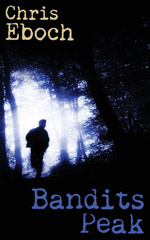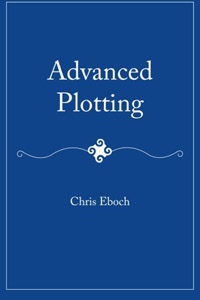by Chris Eboch
Authors dream of having their books made into movies. But even if your story never hits the big screen, you can make your work better by thinking like a scriptwriter. Apply these screenwriting tricks to writing your novel and breathe new life into your work.
Open Big
My brother, Doug Eboch, wrote the original screenplay for Sweet Home Alabama. He gave me this advice on a novel manuscript: “You need a big opening scene. Think of visuals, color and movement—maybe a big party.”
Begin your novel with action, not background, to grab the reader’s attention. “Start with something big and memorable,” says David Steinberg, who wrote the screenplay for Slackers and co-wrote American Pie 2. “And big isn’t as important as memorable. It doesn’t have to be a big explosion, but start off with something exciting, different, weird—something that makes the reader want to keep going.”
Don Hewitt, who co-wrote the English-language screenplay for the Japanese animated film Spirited Away, agrees. But, he warns, don’t just make up any big scene for the sake of drama. “Start with an event that affects the character,” he says. Ideally, this event is a moment of change, where the character starts on a new path.
Establishing the protagonist’s role in the story is one of the most important functions of an opening, whether in films or novels. Let the reader know the character’s goals. “What does he want? What does he really need?” asks Steinberg. “What’s his external goal? And what’s his internal goal—what’s this person’s flaw, and how is he going to be a better person by the end?”
In addition, Doug says, “An opening scene should establish the genre. For comedy, I try to make a really funny opening.” If the opening is exciting, funny, sad or scary, the audience expects the entire movie—or book—to be the same. If the opening is boring, the reader assumes the rest is, too.
Scene by Scene
Set high expectations, then satisfy them. Consider each scene in your novel. How can you make it bigger, more dramatic? “Imagine the worst thing that could happen,” Hewitt says, “and force the issue.”
Doug stresses the effectiveness of “set pieces—the big, funny moment in a comedy, the big action scene in an action movie. The ‘wow’ moments that audiences remember later. Novelists can give readers those scenes they’ll remember when they put the book down.”
Yet even in big scenes, you must balance action and dialogue. Any long conversation where nothing happens is going to be boring. Steinberg says, “Movies are about people doing things, not about people talking about doing things.”
Even in comedies, he says, dialogue must be relevant to the plot. “Dialogue is funny because of the situation, not because it’s inherently funny.” The same goes for novels, too.
Long action scenes can be equally dull. “When you look at the page, it shouldn’t be blocky with action,” says Paul Guay, who co-wrote screenplays for Liar, Liar, The Little Rascals and Heartbreakers.
Adds Hewitt: “Try to be as economical as you can with the action, and as precise as you can. Break it up with specific dialogue to strengthen it.”
Get to the Point
Above all, screenwriters know the value of editing. Studios expect scripts to be within a certain length, generally 90 to 120 pages. Although some movies today run longer than that, any writer who turns in a 300-page script looks like an amateur.
“You should always be moving on to the next story point,” Guay says, “so you have almost no time to indulge in character flourishes or slow moments. If something is off-topic it has to go. Screenwriting teaches you to be ruthless.”
Doug says, “I’ll go back through every line and look for lazy writing, dialogue or description that doesn’t advance the character or plot, and see if there’s a better way to do that.”
As for description, keep it short. “A little detail is good in the beginning,” Steinberg claims, “but readers don’t care what things look like on page three, let alone on page fifty. Use description sparingly, and only if it’s really relevant.”
Novelists who focus on action over description are closer to making their books page-turners. However, novelists don’t have the luxury of visual aids, as screenwriters do. Just use short descriptions to advance the plot, not distract from it.
Novelists can learn from the movie world. Open big, increase the drama in each scene, balance action and dialogue, and edit ruthlessly. You’ll have a stronger story. And who knows? It may even increase the chances of your book being made into a movie.
 Chris Eboch writes fiction and nonfiction for all ages. In Bandits Peak, a teenage boy meets strangers hiding on the mountains and gets drawn into their crimes, until he risks his life to expose them. The Eyes of Pharaoh is an action-packed mystery set in ancient Egypt. The Genie’s Gift is an Arabian Nights-inspired fantasy adventure. In The Well of Sacrifice, a Mayan girl in ninth-century Guatemala rebels against the High Priest who sacrifices anyone challenging his power. Her writing craft books include You Can Write for Children: How to Write Great Stories, Articles, and Books for Kids and Teenagers and Advanced Plotting.
Chris Eboch writes fiction and nonfiction for all ages. In Bandits Peak, a teenage boy meets strangers hiding on the mountains and gets drawn into their crimes, until he risks his life to expose them. The Eyes of Pharaoh is an action-packed mystery set in ancient Egypt. The Genie’s Gift is an Arabian Nights-inspired fantasy adventure. In The Well of Sacrifice, a Mayan girl in ninth-century Guatemala rebels against the High Priest who sacrifices anyone challenging his power. Her writing craft books include You Can Write for Children: How to Write Great Stories, Articles, and Books for Kids and Teenagers and Advanced Plotting.
Learn more at www.chriseboch.com or her Amazon page, or check out her writing tips at her Write Like a Pro! blog. Sign up for her Workshop newsletter for classes and critique offers.
Chris also writes novels of suspense and romance for adults under the name Kris Bock; read excerpts at www.krisbock.com.
This article was originally published in the July 2011 issue of SouthWest Sage and is reprinted here by permission of the author.



[…] Screenwriting Tricks for Novelists […]